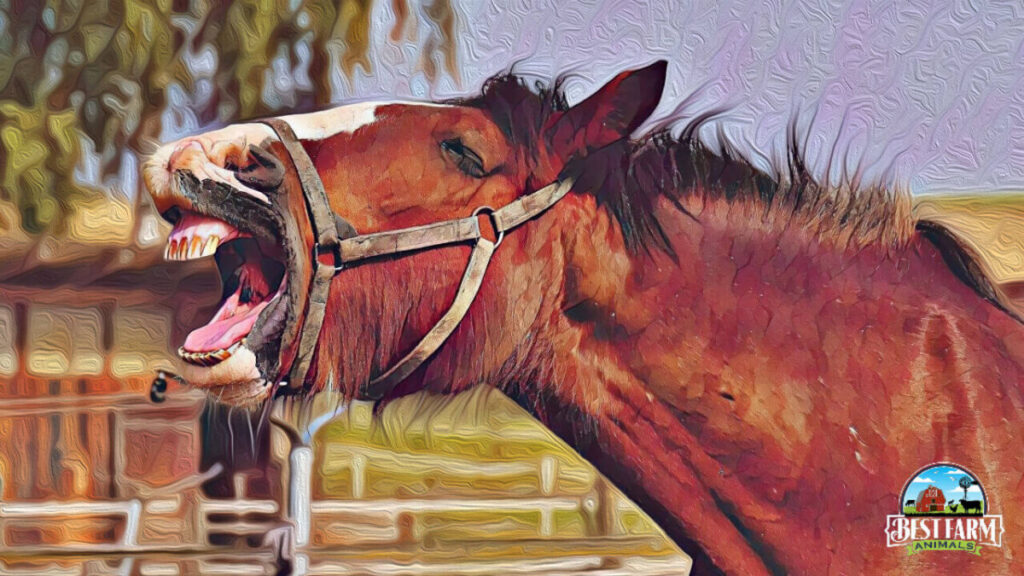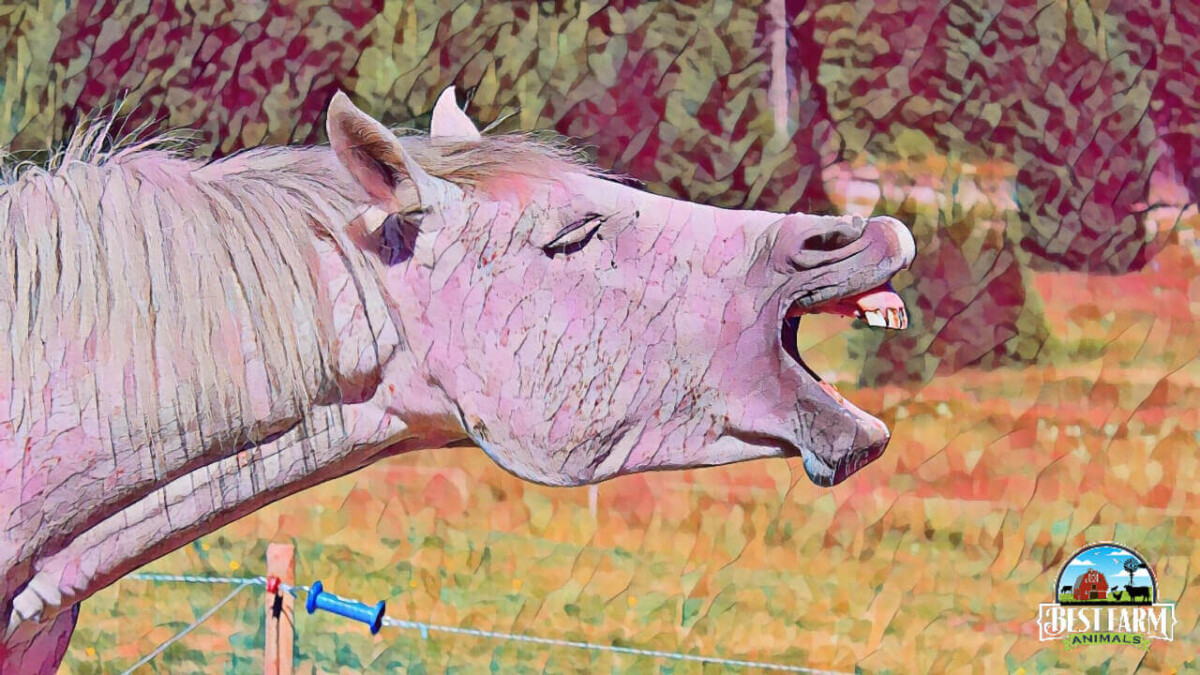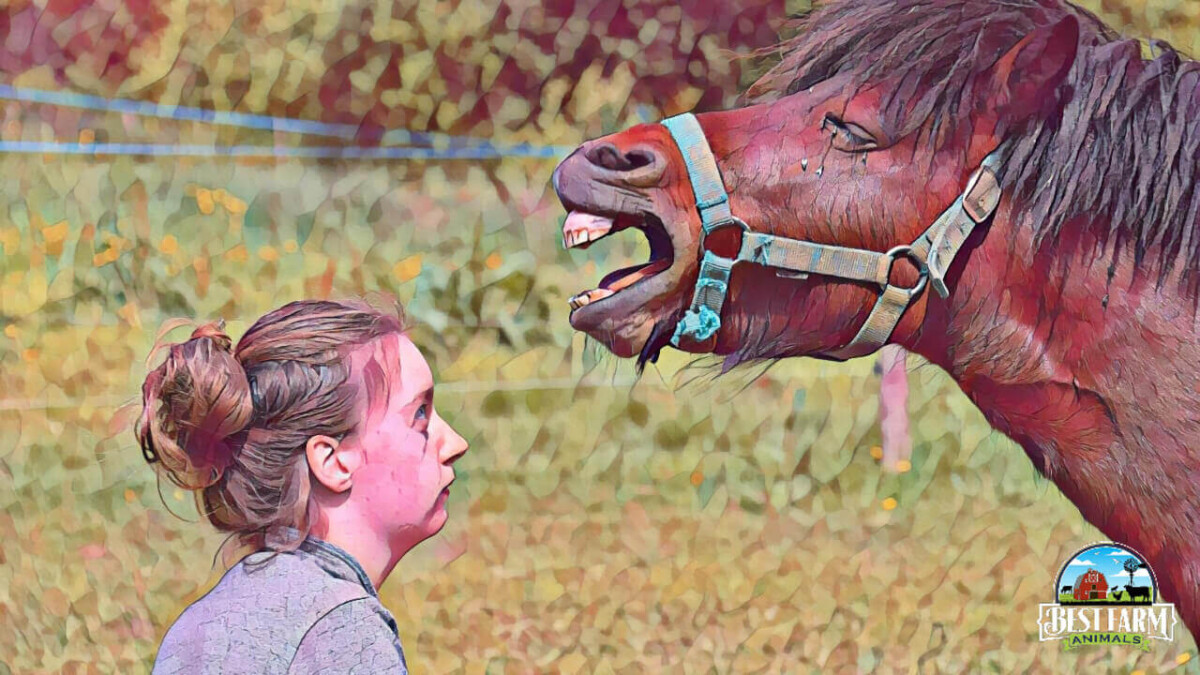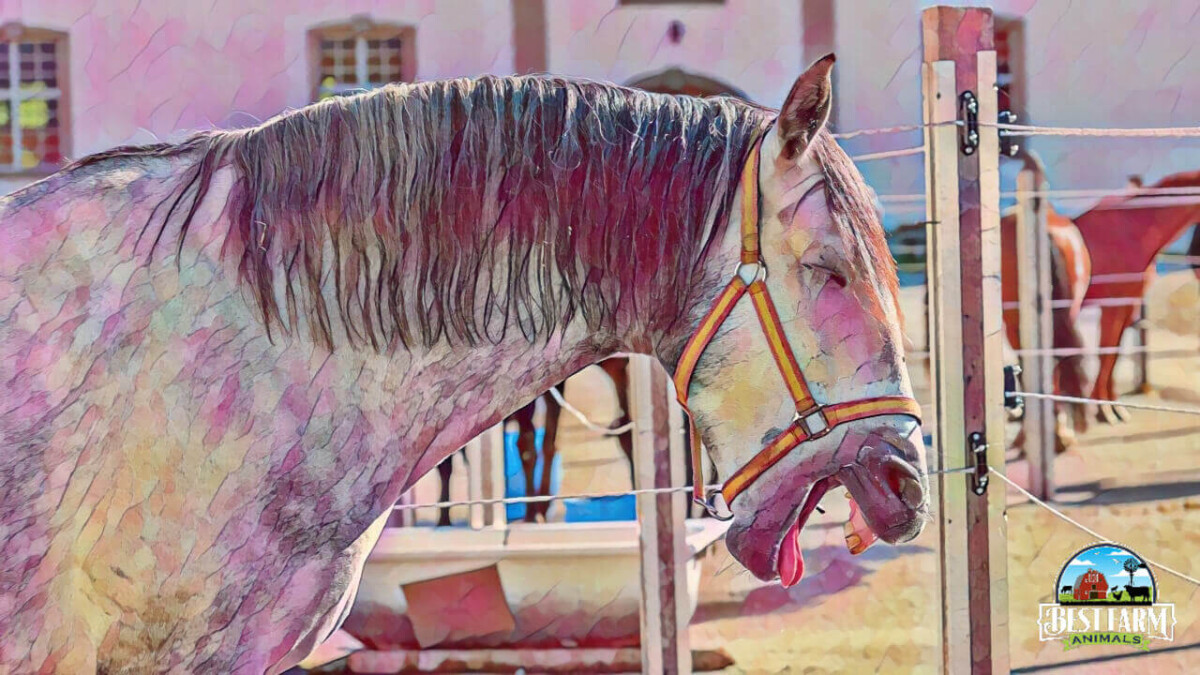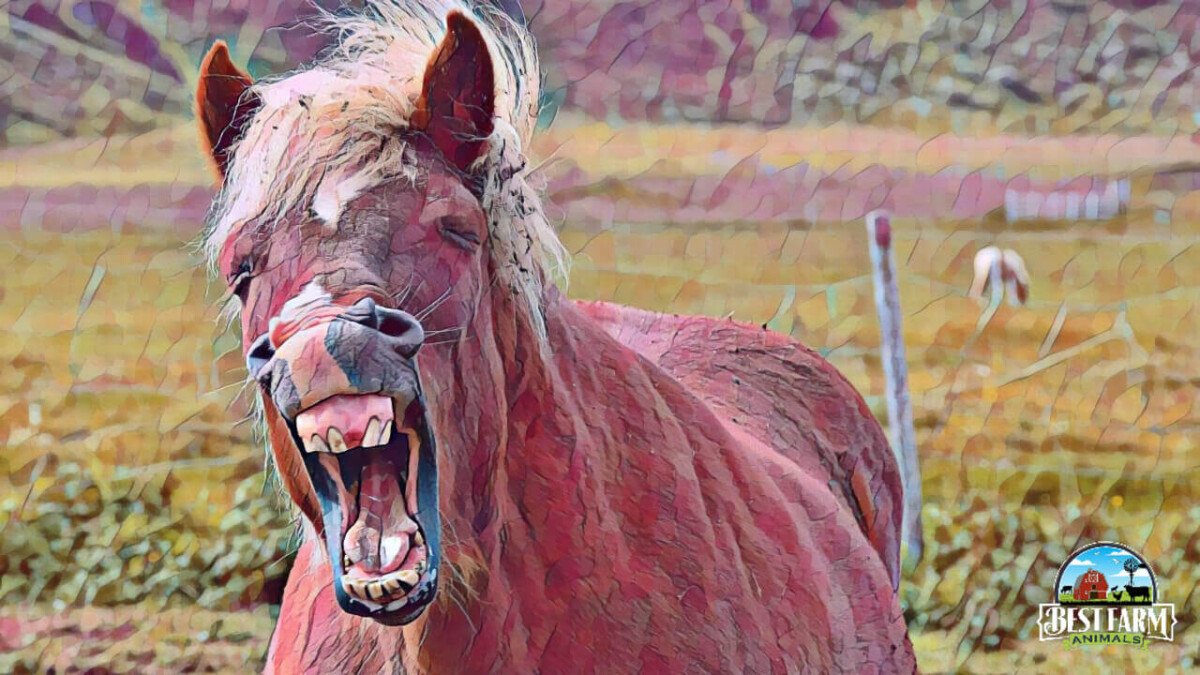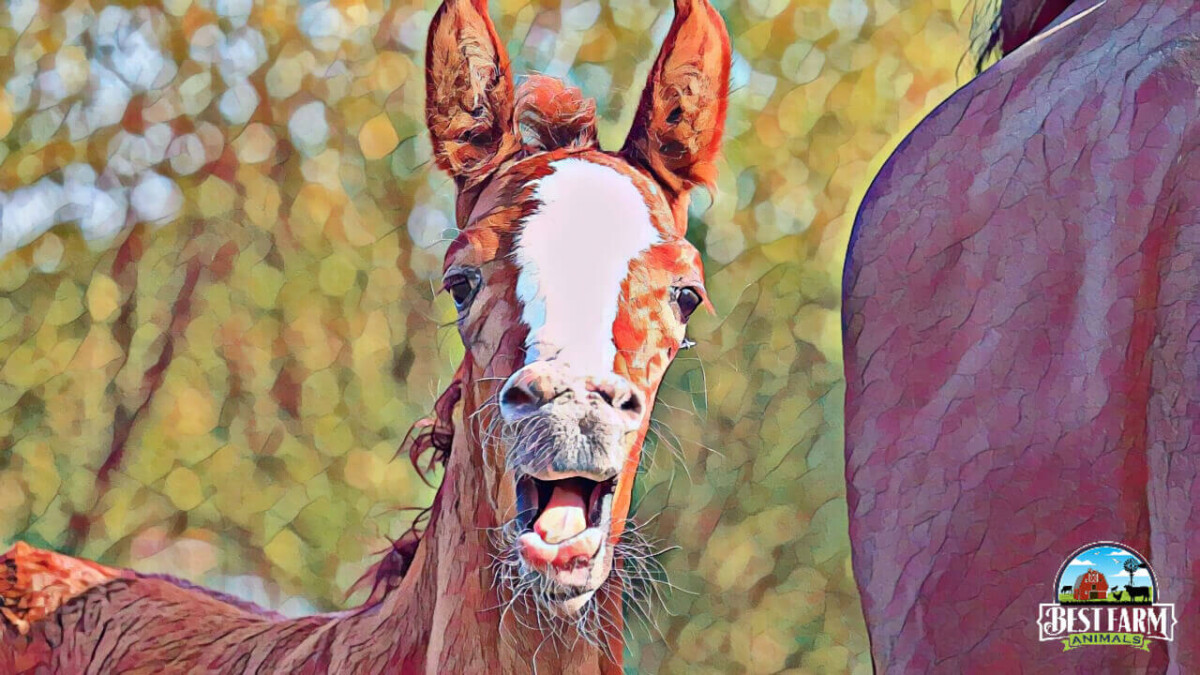Recently, my young filly was yawning a little more than usual. I had kept it in the back of my mind that my filly would start teething soon, but it still surprised me to see her yawning like she was. A little drool was coming from her mouth too, and when I felt her lips, they were fiery hot.
My filly, Albion, needed a bit of help getting her baby tooth cap out, and her yawning was what had alerted me to this. I got to thinking about what other reasons there may be for horses to yawn more than usual. Perhaps, like me, you are also wondering:
Why is your horse yawning? Horses yawn for numerous reasons. Often, a yawn is pretty normal, but it can also indicate something is wrong. Horses yawn to remove food from their cheek pockets, to relieve tension in their facial muscles and neck, to expel breath when they are fatigued, and as a sign of relaxation.
Horses also yawn because of more desperate reasons such as a side effect of a stroke, a dental abscess, choke, onset of colic, and a poorly fitted bit or noseband.
8 Reasons Why Horses May Yawn
You may grab your phone to take a picture of your horse yawning like there’s no end, resulting in some very funny images and videos that proliferate the internet. However, not all yawning is a good sign, and it’s essential to know why your horse is yawning.
Here are some reasons horses yawn and what you can do about each.
1. Dental Issues
Yawning that is repetitive and looks like the horse is struggling with something in their mouth may be a sign of a problem. My Albion had a baby tooth cap that was stuck, but if your horse seems in discomfort while they yawn repetitively, they may have a more serious dental issue.
Some typical issues can include your horse getting something stuck in their mouth, such as a stick that’s twisted in the horse’s palette.
What to Do About This Type of Yawning:
Carefully examine your horse’s mouth for foreign objects, wounds, or broken teeth. To examine your horse’s mouth, you will need an assistant and a bit of guts.
- Stand beside your horse with a helper holding your horse’s head with a strong halter.
- Gently insert your fingers into the gap on the side of the horse’s mouth where the bit rests. There are no teeth here, and you can easily reach for the horse’s fleshy tongue.
- With one hand, reach in and firmly but gently take hold of the horse’s tongue, closing your hand around it and twisting your hand to make an upright fist so the horse can’t bite down as easily.
- Peer into the horse’s open mouth, taking care not to get your fingers under the horse’s back teeth or molars. Examine their mouth for signs of foreign objects, injuries, swelling, or bleeding.
2. Abscesses in the Mouth
Horses may also yawn as a sign of discomfort and pain resulting from a much harder-to-reach spot cause such as an abscess. Abscesses may form along the jaw or even on the tongue or lips. The only sign of an abscess may be slight discoloration, swelling, or a change in the texture of the horse’s soft tissue.
The horse will be in agony until the pressure from the abscess is released.
I recall when a friend’s horse had an abscess in their lower lip. The only sign was a pin-point white spot, swelling, and a stiffer feel of the lip. The horse had been complaining by repeatedly yawning when bridled.
Draining the abscess was a simple matter of squeezing firmly as the abscess had formed an opening and could be drained this way. With the last bit of puss drained, a single white thorn popped out—the cause of the discomfort and pain.
Dental abscesses that form under a tooth will require professional help, and your equine dentist may perform a tooth extraction.
What to Do About This Type of Yawning:
Do a surface inspection for signs of an abscess. If you can drain the abscess without inflicting too much pain on the horse, do so. Consult your dentist or vet if the abscess is in a hard-to-reach spot.
Administering antibiotics may help, but usually, draining the abscess is best.
3. Stroke After Effects
Horses can have strokes and epilepsy. A sign that something has gone wrong is often when your horse continuously yawns or pulls their face. Other signs that may accompany this are when your horse drops food, salivates, or seems unsteady.
Often, the yawning is due to the numbness they may experience in their facial muscles following a stroke. The lips or face may also pull to one side due to neurological imbalance or lesions.
What to Do About This Type of Yawning:
Should you suspect your horse may have had a stroke or suffered some neurological episode, you can check for loss of feeling or sensitivity along the horse’s jaw and face. Apply gentle pressure with the tip of the hoof pick, and if the horse shows no sign of feeling it, you need to contact your vet immediately.
4. Choke
Horses choke on food when they eat too fast or if they swallow and the food is too dry to pass down the esophagus. The blockage can lead to coughing, signs of discomfort, and excessive yawning.
If left untreated, choke can become severe and lead to complications and even death. Look for accompanying signs like tension in the neck and jaw, attempts to regurgitate, slime from the nose and mouth, and nervous pacing in the stable.
What to Do About This Type of Yawning:
If you suspect your horse is yawning due to choke, the best choice is to get your vet out ASAP and remove any food from the horse’s stable or place them in a sandy pen until the vet gets there.
5. Equine Temporomandibular Joint (TMJ) Disease
Most horses with TMJ disease tend to become head shy and shake their heads. Some may even yawn excessively to relieve the TMJ’s pressure. Horses have a TMJ or joint where the top and lower jaw connect, just like people do. When this joint becomes inflamed or degenerates, it can create a painful condition that may contribute to numerous problems.
Signs that may point to yawning because of TMJ may include when your horse yawns as soon as they have to raise or lower their head after they have eaten or when they are asked to round on the bit while ridden.
What to Do About This Type of Yawning:
If you suspect TMJ as being the cause of the excessive yawning, consult an equine chiropractor, an equine bodyworker, and a specialist vet to help diagnose the cause and treat it.
6. Pain Caused by Colic
When your horse has colic, you would see them attempting to roll or kicking under their bellies. I do, however, remember one horse at the yard that would start yawning and pulling her lips to the side whenever she was having another colic bout.
Horses that tuck up and feel pain may open and close their jaws, seeming to yawn when they are actually in pain.
What to Do About This Type of Yawning:
When you suspect your horse may be sick and that yawning is a symptom of this, start checking for other symptoms such as yellow eyelids, pale gums, tucked-in stomach, and heave lines.
7. Bitting Issues
When you ride your horse, and they keep yawning and fidgeting, it is a sure sign they are uncomfortable with their bit. The bit may be too high up in the mouth or pressing on a sensitive jaw nerve and causing discomfort. Yawning is a way to get away from the pressure.
What to Do About This Type of Yawning:
Have your bit checked by someone more knowledgeable about horse tack. Consult your equine dentist to check if any pain-causing issues in your horse’s mouth may make them not want to accept the bit.
8. Your Horse Is a Chipmunk
The final common reason your horse may be yawning is that they are a chipmunk. My gelding, a real fatty, loves storing food in the back of his mouth, so it’s a yawn fest after he has eaten. Luckily, a horse-chipmunk is easy to spot. You’ll see them work their tongue around their mouth while they yawn to loosen any tasty food pockets for a snack.
What to Do About This Type of Yawning:
In this case, you can grab your phone and snap away some great pictures to share with friends and other horse people.
Horse Yawning FAQs
Why does my horse yawn, and is it bad?
Horses yawn to remove food from their mouths, expel air, and stretch their jaw muscles. They can also yawn due to pain, dental issues, choke, or colic. Deciding whether it’s bad when your horse yawns depend on the sum of their symptoms. If they seem to be in pain or discomfort, your horse may need professional help.
Why is my horse yawning after a training session?
There are many potential reasons why your horse could be yawning as soon as you finish schooling them. A horse ridden behind the vertical line of the forehead to the ground may develop tension issues in their facial muscles and throat latch area. Yawning is a way for the horse to relieve the pressure in these areas.
Is there a reason my horse yawns after a session with the equine body worker or chiropractor?
Horses release tension by yawning. When an equine bodywork session has released the muscles in your horse’s body, they may experience a sudden release of muscle and mental tension, which can trigger yawning. The yawning may give over to the classic “lick-and-chew” behavior that indicates ultimate relaxation.
Conclusion
Yawning is cute, and if your horse is merely doing it as a sign of relaxation and catching up on some hidden snacks in their cheek-stores, you have nothing to worry about this time. However, yawning can also be a serious sign of something being wrong.
Err on the side of caution, and if you don’t feel like your horse is entirely comfortable when they yawn, you should get a vet out for a checkup. Learn more about horses showing signs of discomfort in our article on horse drooling.
My Favorite Equine Resources For Horses and Donkeys
This list contains affiliate products. Affiliate products do not cost more but helps to support BestFarmAnimals and our goal to provide farm animal owners with accurate and helpful information.
Squeaky Chicken Toy is hilarious to watch and the horses love it! It’s not super tough so keep it away from dogs.
Dewormer with Ivermectin: I use this for my horses and my goats. Duvet makes a great dewormer. I switch between the Ivermectin one and one like this one so the worms don’t get immune to it.
Manna Pro Apple Flavored Nuggets are a delicious smelling treat that my horses go crazy over.
Equinity Amino Acid Supplement for Horses makes a big difference for any horse that’s struggling with arthritis, hoof issues, or just generally. It’s great for older horses who can’t absorb all the nutrients in their food as well!
Manna Pro Weight Accelerator helps older horses gain weight and stay healthier! This was especially helpful when one of my older horses lost weight over the winter and helped her regain her weight over the summer!
Farnam Fly Control goes on the horse or donkey and will keep the flies off your sweet pet. It makes horses way more comfortable and will keep sores from getting infected as well.
Wound Kote protects sores and wounds. It acts as an antiseptic and helps wounds heal faster. It works on both my horses and goats.

